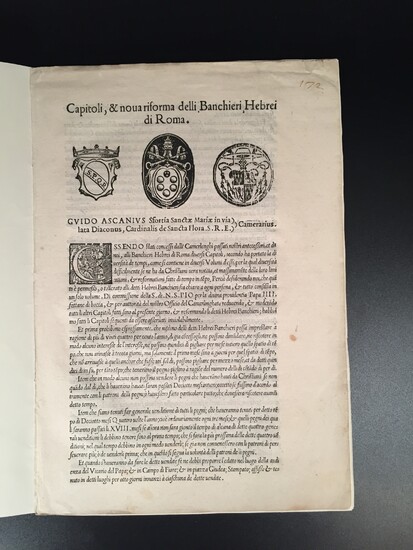Capitoli, & nova riforma delli Banchieri Hebrei di Roma.
By PIUS IV]
[JEWISH BANKERS IN ROME] FIRST EDITION. Folio. 2 unnumbered, unsigned leaves. Elegant Italic letter. Woodcut arms of Rome, Pope Pius IV and Cardinal Guido Ascanio Sforza to upper margin of first, decorated initials. Minimal mainly marginal spotting. A fine copy in modern wrappers. A fine copy of this very scarce edict by Pope Pius IV (1559-65) a remarkable ephemeral survival regulating Jewish bankers in Rome. Copies of this document were distributed to be attached to the banchi or inside the bankers stores, so that all Christians could read them carefully. On the one hand, Pius IV relaxed regulations in Rome, revoking some of the harsher provisions and imposing controls on rents charged to the Jews in the ghetto; on the other hand, unlike his predecessor, he enforced tougher financial regulations for the Jewish banchi (Poliakov, Jewish Bankers , 181, 190). This edict forbad money-lending at an interest greater than 24 per cent instead of the customary 30, demanding interest on interest, reckoning as one month any shorter span than 30 days or selling what was pawned by Christians before the passing of 18 months. Jewish bankers should also ensure that any Christian borrowing money or pawning belongings signed a paper written in the Italian vernacular as required of all documents in bankers books specifying his name, address, the amount borrowed or pawned, and the time span for restitution, according to the practice of the Monte di Pietà. First established in Italian cities in the 1460s, the Monti di Pietà were the result of Franciscan preaching against Jewish money-lending and were meant to put an end to the iniquitous usury of the Jews by replacing them in the small loans sector , without interest, in order to assist the poorer population (Toaff, Jews , 239). The Monti notwithstanding, Jewish bankers continued to operate their business unofficially or through new agreements with the authorities, as well as thanks to the support of wealthier borrowers. This edict also provided regulations on house-keeping including the regular cleaning of clothes, to avoid the presence of moth, and the compulsory keeping of cats to chase away mice, so as to prevent pest damage to pawned objects. A very fine copy of this very scarce document for Jewish and economic history in Italy. No copies recorded in the US.Fumagalli 305; USTC 852964; EDIT16 25104. Not in Kress or Goldsmith. L. Poliakov, Jewish Bankers and the Holy See (London, 1965); A. Toaff, Jews, Franciscans, and the First Monti di Pietà in Italy (1462-1500), in The Friars and Jews in the Middle Ages and Renaissance, ed. S.E. Myers et al. (Leiden, 2004), 239-54.
Published by: Rome, Antonio Blado, 1563
Vendor: Sokol Books Ltd. ABA ILAB
Buy Now on
By PIUS IV]
[JEWISH BANKERS IN ROME] FIRST EDITION. Folio. 2 unnumbered, unsigned leaves. Elegant Italic letter. Woodcut arms of Rome, Pope Pius IV and Cardinal Guido Ascanio Sforza to upper margin of first, decorated initials. Minimal mainly marginal spotting. A fine copy in modern wrappers. A fine copy of this very scarce edict by Pope Pius IV (1559-65) a remarkable ephemeral survival regulating Jewish bankers in Rome. Copies of this document were distributed to be attached to the banchi or inside the bankers stores, so that all Christians could read them carefully. On the one hand, Pius IV relaxed regulations in Rome, revoking some of the harsher provisions and imposing controls on rents charged to the Jews in the ghetto; on the other hand, unlike his predecessor, he enforced tougher financial regulations for the Jewish banchi (Poliakov, Jewish Bankers , 181, 190). This edict forbad money-lending at an interest greater than 24 per cent instead of the customary 30, demanding interest on interest, reckoning as one month any shorter span than 30 days or selling what was pawned by Christians before the passing of 18 months. Jewish bankers should also ensure that any Christian borrowing money or pawning belongings signed a paper written in the Italian vernacular as required of all documents in bankers books specifying his name, address, the amount borrowed or pawned, and the time span for restitution, according to the practice of the Monte di Pietà. First established in Italian cities in the 1460s, the Monti di Pietà were the result of Franciscan preaching against Jewish money-lending and were meant to put an end to the iniquitous usury of the Jews by replacing them in the small loans sector , without interest, in order to assist the poorer population (Toaff, Jews , 239). The Monti notwithstanding, Jewish bankers continued to operate their business unofficially or through new agreements with the authorities, as well as thanks to the support of wealthier borrowers. This edict also provided regulations on house-keeping including the regular cleaning of clothes, to avoid the presence of moth, and the compulsory keeping of cats to chase away mice, so as to prevent pest damage to pawned objects. A very fine copy of this very scarce document for Jewish and economic history in Italy. No copies recorded in the US.Fumagalli 305; USTC 852964; EDIT16 25104. Not in Kress or Goldsmith. L. Poliakov, Jewish Bankers and the Holy See (London, 1965); A. Toaff, Jews, Franciscans, and the First Monti di Pietà in Italy (1462-1500), in The Friars and Jews in the Middle Ages and Renaissance, ed. S.E. Myers et al. (Leiden, 2004), 239-54.
Published by: Rome, Antonio Blado, 1563
Vendor: Sokol Books Ltd. ABA ILAB



